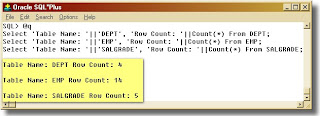Here are the steps:
1) Write out a sample of the code you want generated. Obviously, you'll want to run it first to make sure you're getting the final results needed.
Select 'Table Name: '||'SALGRADE', 'Row Count: '||Count(*) From SALGRADE;2) Break down the query into literal, and variable parts. In this example, in two different places, I want the actual table name from User_Tables to be inserted into the code.
Select 'Table Name: '||'-- the ending quote prefaces the following table_name3) Change the sample table name (SALGRADE) to the actual column name (Table_Name), and add the concatenation bars on the front, and back.
SALGRADE
', 'Row Count: '||Count(*) From -- the beginning quote closes the table_name
SALGRADE
;
Select 'Table Name: '||'4) Add q'[ and ]' to the front and end of each literal line. (As you may know, it can be other things than square brackets [].) On the last literal of a semicolon, I just stuck with the regular single quotes since there were no embedded quotes on that line.
||table_name||
', 'Row Count: '||Count(*) From
||table_name||
;
q'[Select 'Table Name: '||']'5) Now add a 'SELECT' at the beginning, and a 'FROM' at the end (and any other options you want ORDER BY or WHERE).
||table_name||
q'[', 'Row Count: '||Count(*) From ]'
||table_name||
';'
Select q'[Select 'Table Name: '||']'6) Add a SPOOL command, and use a 'SQL' extension. Spool Off at the end. If you're brave, you can run the queries immediately. I usually test a line or two before I do that. In this example, I had previously SET PAGESIZE=0 to kill the headers.
||table_name||
q'[', 'Row Count: '||Count(*) From ]'
||table_name||
';'
From User_Tables
Where Table_Name in ('EMP','DEPT','SALGRADE');
Spool TestQ.SQL
Select q'[Select 'Table Name: '||']'
||table_name||
q'[', 'Row Count: '||Count(*) From ]'
||table_name||
';'
From User_Tables
Where Table_Name in ('EMP','DEPT','SALGRADE');
Spool Off
/* Run the spooled query */
@TestQ
 Go forth and enjoy!
Go forth and enjoy!















No comments:
Post a Comment